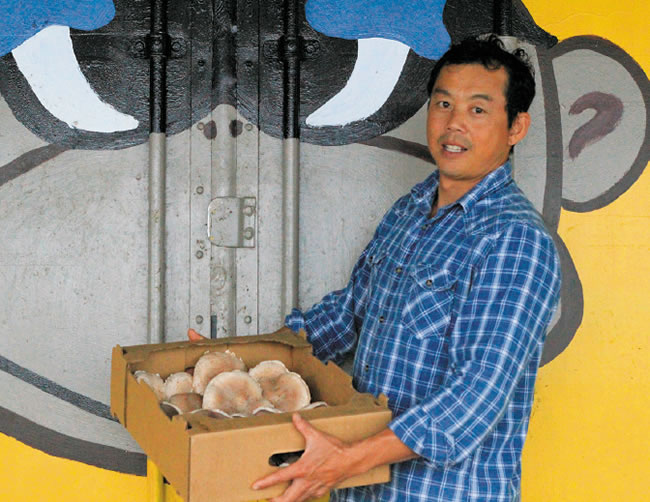A Small Farm’s Answer To High Cost Of Imported ’Shrooms

Fung Yang with a box of freshly harvested, Waimanalo-grown mushrooms from his Small Kine Farm. Photo from Fung Yang.
There’s a new type of fungus in town. But don’t worry, this one is good for you.
Small Kine Farm in Waimanalo is growing portabella mushrooms – the only locally grown USDA organic certified portabellas in the state. (The Mushroom Council has approved this spelling.) Dating back to 2008, the farm’s mission is a simple one, said owner Fung Yang:
“Learning from nature; mirroring ecosystems by promoting, repurposing under-utilized resources and growing organic produce to benefit our community.”
It all started with Yang’s second business, Oahu Community Recycling, which offered pick-up services for families throughout the island. “This was before the City & County of Honolulu had implemented its own municipal door-to-door recycling service,” Yang noted.
In looking for a way to expand the business, he discovered that 85 to 90 percent of Hawaii food is imported. Even more startling, he said, was that millions of dollars’ worth of mushrooms were shipped in each year.
Using green recycling and composting systems, Yang now provides the popular mushrooms to island customers. “Small Kine Farm and Oahu Community Recycling have worked in tandem to help ‘close the cycle’ of energy inputs and outputs in our local food system,” he explained. “Recycled green waste is transformed into a mushroom-growth substrate, and the mushrooms are sold back into our economy through farmers markets, restaurants and distributers like Whole Foods.”
Currently, the farm offers two mushrooms: Tutu Portabella and Keiki Portabella, named by the farm workers. Tutu Portabella is a minimum of 4 inches in diameter and is the larger of the two. Keiki Portabella, commonly known as brown crimini, has a lighter flavor and crisper texture.
Knowing that growing these mushrooms is no easy task, Yang also is aware of the challenges other local farmers currently face. “The problems across the nation are clearly magnified in Hawaii. Moreover, declining agricultural production results in the need for the state to import the vast majority of its food, and transportation costs are making that process increasingly expensive.”
Since imported food isn’t always cheap, Yang stressed the importance of learning how to grow it. Beyond that, his passion for nature stems from a childhood in Hong Kong surrounded by air and water pollution.
“Being the owner of Oahu Community Recycling and Small Kine Farm, I have channeled my passion for preserving the environment and entrepreneurial spirit to create an innovative, sustainable business model.”
For more information on the mushrooms, visit smallkinefarm.com.





